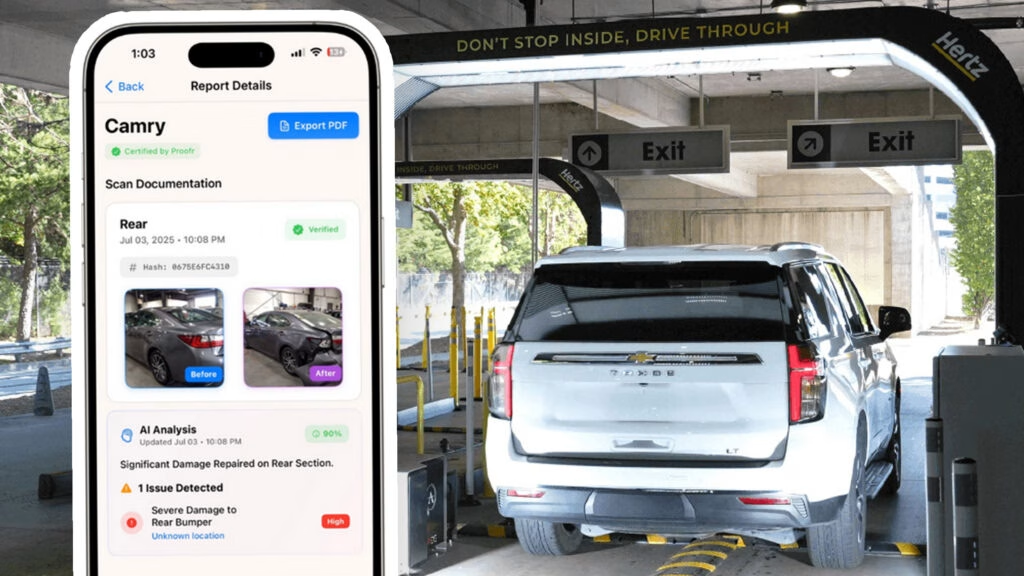What Happens When Hertz’s AI Says You Damaged the Rental—But You Didn’t?
If you’ve rented a car lately, you might’ve noticed something new at the return lot: a row of cameras and scanners quietly sizing up your vehicle. That’s Hertz’s UVEye system, and it’s not just for show. These AI-powered scanners are designed to spot dents, dings, and scratches—sometimes before you’ve even unloaded your suitcase. But what if the AI gets it wrong? And what happens when your own photos or third-party app evidence don’t seem to matter?
Can You Really Prove Your Innocence With Your Own Photos or Apps?
Plenty of renters have started snapping photos and videos of their cars before and after their trips, hoping to avoid surprise damage charges. Apps like Proofr have even sprung up, promising to document your rental’s condition with time-stamped images and AI analysis. The logic is simple: if you can show the car was fine when you dropped it off, you’re in the clear.
But here’s the catch—Hertz’s system often overrides any outside evidence, no matter how detailed or accurate. Multiple customer reports show that even when renters submit clear, time-stamped photos or videos, the company’s AI assessment takes priority. In some cases, renters have been hit with hefty fees for damage they insist they didn’t cause, with little to no human review of their evidence.
Why Doesn’t Hertz Accept Third-Party Evidence?
It’s not just stubbornness. Hertz and other rental giants have invested millions in these AI scanning systems, betting that automation will speed up returns and reduce disputes. From a business perspective, relying on their own tech makes sense—they control the process, the data, and the outcome.
However, this approach creates a frustrating dead end for customers. Even when renters provide compelling proof from outside apps or their own cameras, Hertz’s system typically ignores it. According to recent coverage in major business outlets, there’s no public evidence that Hertz has accepted third-party app evidence in damage disputes. In fact, some customers say their video proof was dismissed outright, leaving them with no real way to challenge the AI’s verdict.
What’s the Real Problem—AI or the Lack of Human Support?
The technology itself isn’t inherently bad. Automated damage detection can catch issues that humans might miss, and it can help standardize what counts as “damage.” But when there’s no human in the loop, things get dicey. If the AI flags a scratch that was already there—or simply makes a mistake—renters often find themselves stuck. There’s no live support, no appeals process, just an automated bill.
This lack of human connection is what stings most. When you know you didn’t cause the damage, but there’s no one to listen or review your evidence, it doesn’t feel like a fair fight. It’s not a negotiation—it’s a brick wall.
Are Other Rental Companies Doing the Same Thing?
Hertz is leading the charge, rolling out its UVEye system to airports across the US, with a goal of reaching 100 locations by 2026. Other rental brands are watching closely, and some are reportedly considering similar AI setups. The industry is clearly moving toward automation, but the backlash from frustrated customers is growing just as fast.
Some companies are experimenting with ways to bring humans back into the process, at least for disputes. There’s talk of adding live support or clarifying policies around third-party evidence, but for now, most systems remain strictly AI-driven.
What Should Renters Do to Protect Themselves?
If you’re renting a car, don’t skip the pre- and post-rental photos—just don’t expect them to guarantee your protection. Use apps like Proofr or your phone’s camera to document every angle, inside and out. Make sure your images are time-stamped and saved somewhere safe.
If you’re hit with a damage claim you believe is unfair, gather all your evidence and push for a human review. Escalate your case through customer service, and if needed, file a complaint with your credit card company or a consumer protection agency. Persistence can pay off, even if the initial response is automated.
The big takeaway? Navigating AI-driven rental car returns isn’t about perfection—it’s about smarter adjustments. Start with one change this week—maybe an extra round of photos or a quick chat with the lot attendant—and you’ll likely spot the difference by month’s end.

